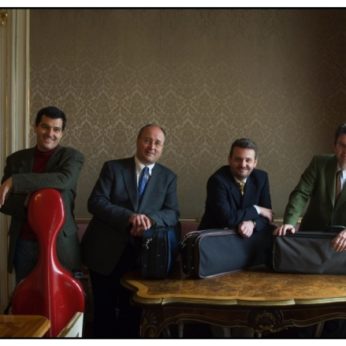Composer: Karl Weigl (b. 1881 - d. 1949)
Performance date: 27/06/2010
Venue: Bantry Library
Composition Year: 1904
Duration: 00:43:34
Recording Engineer: Anton Timoney, RTÉ lyric fm
Instrumentation: 2vn, va, vc
Instrumentation Category:String Quartet
Artists:
Artis Quartet (Peter Schuhmayer, Johannes Meissl [violins], Herbert Kefer [viola], Othmar Müller [cello]) -
[quartet]

Karl Weigl’s music will not be lost.
We will return to it after the storm has passed. We will return to those who
have written real music. Pablo
Casals
I
always considered Dr Weigl as one of the best composers of the old school; one
of those who continued the glittering Viennese tradition. He truly preserves
this old culture of musical spirit which represents the best of the Viennese
tradition. Arnold
Schoenberg 1938
Karl
Weigl was one of the many Jewish Viennese composers, whose music has almost
disappeared due to the deadly effects of the Nazi occupation of Austria in
1938. Their names and their music were wiped off publishers’ and concert
promoters’ lists. Those, like Weigl, who managed to escape often had to start
again in impoverished exile – in USA in Weigl’s case – where they were almost
completely unknown. Weigl spent his last years withdrawn and isolated though he
still managed to compose two major symphonies and three string quartets. And
even now, but for dedicated advocates like tonight’s performers, his music
would remain unknown and almost unplayed.
It all began so
promisingly. In 1904 he was working under the great Gustav Mahler at the Vienna
Court Opera. At the same time he joined with Schoenberg and Zemlinsky to found
the Vereinigung schaffender
Tonkünstler, which promoted
works by a veritable roll-call of Vienna’s great composers – Richard Strauss,
Zemlinsky, Mahler, Schoenberg, Pfitzner, Reger, Bruno Walter and Weigl himself.
Weigl went on to become a full-time composer and, after the First War, a
Professor of Composition. His works were performed by the great and the good
and he was published by Universal and Schotts – all this came crashing down in
March 1938 and he was lucky to escape with his life.
This
youthful work outwardly corresponds to tradition – an opening allegro in sonata
form, a devastatingly powerful and moving Adagio in three parts with a coda
leading to an extended Scherzo with an exquisite Trio. The stunningly beautiful
final slow movement is reached by an extensive recitative and recapitulation.
Perhaps influenced by Mahler, the work is built on a massive scale and his
handling of Brahms’ permanent variation and development is masterly for a
composer so young. His melodic invention is second to none.
When Weigl’s path
diverged from that of Schoenberg, Weigl wrote convincingly about the need to
cherish the old forms: As soon
as a new form or means of expression is found, any number of fanatics stand up
to proclaim the exclusivity of the new art form.One must always repeat the
obvious: firstly , conquering new means of expression does not make all former
ones obsolete; secondly, it only matters if someone has something new to say
and he does it in a form which is mostly his own. Finally one must never
knowingly copy someone else – either dead or living – and only use those means
of expression which come partly from one’s own inner development and partly
from the absorption of outside influences.
Copyright © 2025 West Cork Music. All rights reserved.
Designed and developed by Matrix Internet